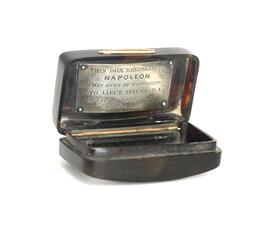Tokens of Gratitude Reflect Celebrated Military Leaders
Tokens of Gratitude Reflect Celebrated Military Leaders
by Rosei Frost
Objects owned by celebrated people have been sought, prized and collected for centuries. Where there has been famous people, relics, trophies and gifts have accompanied them. From pieces of the ‘True Cross’ in Christianity to the strikingly beautiful headdress of Moctezuma II (the last Aztec emperor), these objects have been bought, collected and treasured. Having physical objects that were handled by these key historical figures adds a touch of magic and allows us to divulge fantasies of what it would have been like at the time.
This April’s Militaria sale offers not just one opportunity but two, to own items that belonged to acclaimed military leaders. The first is a snuff box with an inscription to the lid “THIS BOX BELONGED TO NAPOLEON AND WAS GIVEN BY MADAME BERTRAND TO LIEUT. HAYNE R.A. AT ST HELENA 18TH MAY 1821” Lieutenant R.A Hayne is cited as a “close personal” attendant to Napoleon Bonaparte during his exile in St Helena. There appears to have been a small close-knit community formed during his five years in St Helena, Madame Bertrand was a member of this community. Fanny Bertrand (nee Dillon) was the second cousin of Empress Josephine, Napoleon’s first wife. Her marriage was arranged by Napoleon to General Henri Gatien Bertrand and they both accompanied Napoleon to his exile on St Helena.
Lieutenant R. Hayne appears to have received a number of Napoleon related items whilst in his service. Sotheby’s held a sale in 1898 titled ‘Sale of Napoleon Relics’ in the Dundee Evening Telegraph. The relics were consigned by Lieutenant R. Hayne’s daughter and the newspaper article detailed that it attracted ‘some attention’ showing there was a keen interest in Napoleon objects decades after his death.
The snuff box being auctioned this month did not form part of the original Sotheby’s sale but has been passed down through the family of a Lieutenant Philip Ditmas. He was stationed on St Helena to guard Napoleon at the same time as Lieutenant R. Hayne. Whether it was gifted to him, won in a game of cards or used to settle a debt is sadly undocumented and can be left to our own imaginations.
The second object comes closer to home and was gifted by the former British Prime Minister, Sir Winston Churchill. His indomitable spirit, eloquent speeches, and unwavering leadership during times of crisis earned him a place among the greatest statesmen in history. Churchill was also a prolific writer and historian, an accomplished amateur artist, and cultivated many other hobbies and interests, not least being an avid animal lover and keeper of numerous types of pets and animals. He kept goldfish in his ponds at Chartwell, in 1938, the round pond was stocked with a thousand golden orfe which he often fed personally with maggots, even when he was Prime Minister during the Second World War. When Harrods closed their livestock department during the Second World War, Churchill agreed to give refuge to their stock of fish at Chartwell. When he became Prime Minister again in 1951, he had five tanks of tropical fish installed at Chequers.
In 1951 Churchill’s office called Mr R.J. Whitwell (a tropical fish breeder) to ask him to visit Chartwell House to discuss and advice on keeping exotic fish. On his departure Mr Whitwell was given a cigar by Sir Winston Churchill to smoke on his way home. He kept the letter and cigar (untouched) and it comes to auction from Mr R.J. Whitwell’s nephew.
Both the letter and cigar can be prized for different reasons. The cigar is synonymous with the image that is conjured up when the name ‘Churchill’ crops up. Widely publicised smoking cigars throughout his career it has been iconic and ingrained in the public memory. The letter offers a unique glimpse into his private life at his home in Chartwell. This more intimate side of him is not as well documented and because the letter is written in colloquial language, it allows us a unique vision of him tending his fish at home. “The Black Mollies are breeding at so great a rate and the other children are growing up so fast that we shall soon have to move out on to the lawn.”
Both lots go under the hammer on the 18th April.
